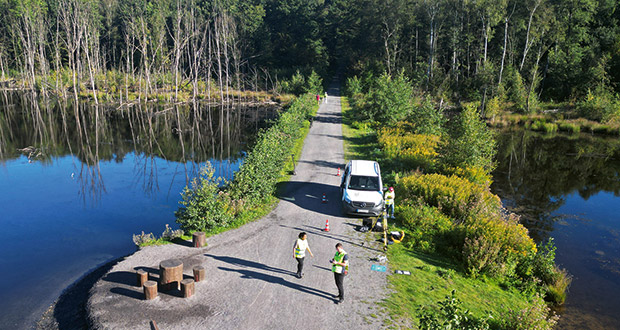Water and green spaces not only improve the urban climate, they also offer people in the Ruhr metropolis recreation on their doorstep. Against this backdrop, an intact blue-green infrastructure is becoming increasingly important. In a new project entitled “WaterSense”, the Research Center of Post-Mining (FZN) at the TH Georg Agricola University (THGA), Bochum/Germany, is investigating how water management in the Ruhr region can be made even more sustainable in future. The researchers are focussing in particular on the polder areas. Huge quantities of water accumulate here, which the scientists believe should be utilised more efficiently in order to counter the effects of climate change (Figure 1). The “WaterSense” baseline study is being funded by the RAG-Stiftung, Essen/Germany, for one year.
“Water management in our region is heavily influenced by mining,” explains project manager Sebastian Westermann. In order to keep the Ruhr region dry, it is necessary to move a good 1 bn m3 surface water every year. This is the volume that accumulates in the polder areas alone – i. e. in the areas where mining has left depressions and faults that have to be artificially drained. This measure is one of the so-called perpetual tasks of the coal industry, which are financed year after year by the RAG-Stiftung. “Polder measures have a significant impact on our water balance and therefore also on agriculture and forestry, for example. We want to find out whether and how interventions in the water balance of these areas can be optimised in the future in order to use the water flows and counter the effects of climate change more effectively,” says Westermann. “To this end, we are investigating the purposes for which water is used in the Ruhr region as a whole and what potential is still possible.”
“With this project, we are not only promoting modern research in the field of water management, but also making an important contribution to the further development of the Ruhr area as a region worth living in. At the same time, we expect the results of the study to provide us with valuable insights that can be useful in tackling the perpetual obligations,” explains Bärbel Bergerhoff-Wodopia, member of the RAG-Stiftung’s Executive Board.
As a first step, the researchers want to identify institutions and stakeholders that deal with the georesource water in the Ruhr metropolis, especially in connection with perpetual tasks – these include associations, authorities and companies. “With their support, we can build up a corresponding database that we can use to comprehensively assess the hydrogeological condition of our region. This will provide us with the necessary scientific and technical knowledge,” explains Westermann. He is already thinking about the end of the project: “Our aim is to find potential partners for a major project proposal in the field of sustainable polder management, which we then want to submit following our “WaterSense” baseline study – so that everything stays in flow.” (THGA/Si.)
